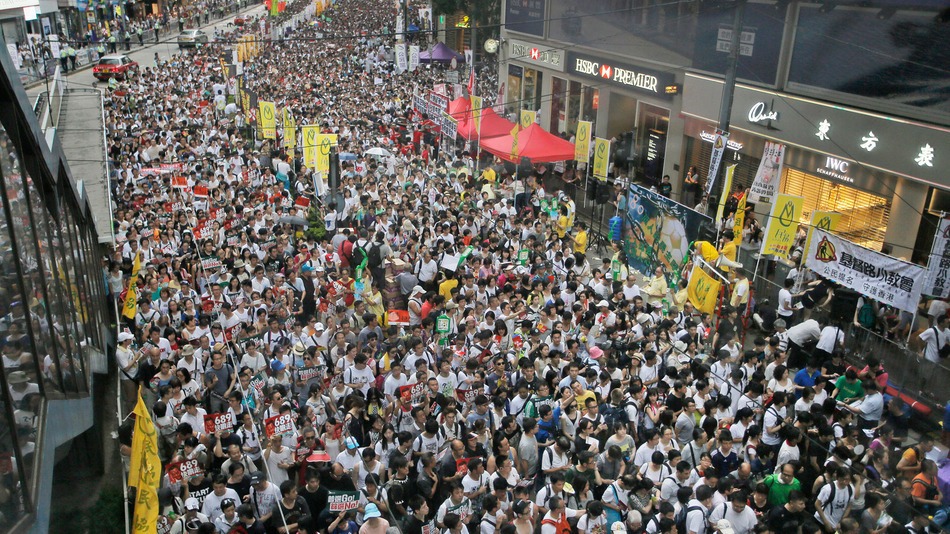FEATURE- Tensions between Hong Kong and the rest of China are not just political, as increasing interaction and cultural differences in recent years cause rising friction between locals and mainlanders.
When Echo Wanyu Li returned from her studies abroad, she found discrimination in Hong Kong, on the doorstep of her native mainland China, to be worse than it was halfway around the world in the United States.
“If you go shopping, sometimes, when you are not local or speak Mandarin Chinese, you can see the dislike on their face,” said Lee, 25, who spent a year at Cornell University in New York state.
She has learned Cantonese, the local language, but still feels more comfortable in New York than Hong Kong.
The territory has seen political protests this week against Beijing’s control of its electoral procedures. But tensions on a more individual, cultural level have been on the rise since the handover from British colonial rule in 1997.
Chinese mainlanders are often resented in the city, referred to as “locusts” descending on the city for its resources and amenities.
Locals complain of behaviour such as spitting, queue jumping or letting their children urinate in public places, which would raise no eyebrows in rural China.
Mainlanders say those are isolated transgressions by a few uncouth offenders, and the backlash against them all is unfair.
Rafaela Yilun Fan, 25, who moved from a mainland province six years ago, said a shopkeeper kicked her out and shouted insults after she touched the clothes on display.
Part of the resentment comes from the sheer numbers of new arrivals.
In 2013, 40 million tourists from China arrived, nearly six times the size of the resident population, according to Hong Kong’s Census and Statistics Department.
Health services came under pressure, as expectant mothers crowded over the border for the better-equipped maternity wards and the rights awarded to children born in Hong Kong. The rules have now been changed to bar mainland women from giving birth in the territory’s hospitals, unless they have a local husband.
There have also been public outcries over runs on medicines or infant milk formula by visitors from the mainland.
Many also come to stay. In the first six months of 2014, an average of 113 mainlanders moved to Hong Kong each day on its one-way permit plan.
The tourists may be resented, but their money is welcome. In 2013, tourism income reached 343 billion Hong Kong dollars (44.25 billion US dollars), according to Hong Kong’s Tourism Commission.
But even tourism professionals have started complaining. Lifeguards staged a protest this summer against overcrowding by Chinese visitors at public beaches and pools.
A group of residents protested in the popular shopping district of Tsim Sha Tsui in February, telling the “locusts” to go home, in a demonstration condemned as “barbaric” by authorities.
The influx of tourists “makes Hong Kong people unhappy because they find that they cannot get what they need from their neighbourhood, and it’s changing the face of their neighbourhood,” local activist Katty Law said.
In shopping districts like Mong Kok, Tsim Sha Tsui and Causeway Bay, local stores and facilities are being pushed out in favour of luxury shops targeting mainlanders, she said.
“Hong Kong is not a very big place. We don’t have many public facilities already, for example our basketball or badminton courts, are quite crowded without the tourists,” Law said.
“So people start to think.’OK, I paid the taxes and why are these kinds of public services being somehow taken away or exploited.’ I think it is a valid question to ask.”
Authorities appear as concerned about the backlash as by the influx.
A consultation by the Equal Opportunities Commission this month is asking the public whether to extend the scope of anti-discrimination legislation, to outlaw discrimination by origin.
This would allow mainlanders to seek legal redress if they can demonstrate discrimination by Hong Kong locals, even though they share broad ethnic roots.
The change would bring Hong Kong into line with other jurisdictions, where “it is not a prerequisite that the person discriminating be of a different ethnicity” for the behaviour to be illegal, said Puja Kapai, director of the Centre for Comparative and Public Law at the University of Hong Kong. SAPA






 WhatsApp us
WhatsApp us 

